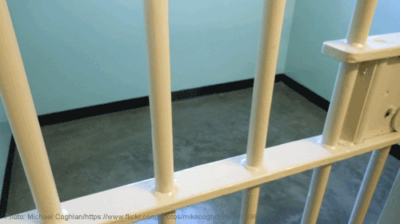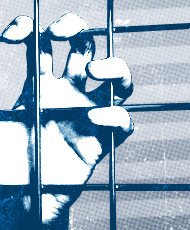
Rosas v. Luna
What's at Stake
Rosas v. Luna is a class action lawsuit brought by the ACLU of Southern California (ACLU SoCal), the ACLU’s National Prison Project (NPP), and the law firm of Paul Hastings LLP in 2012 against the Los Angeles Sheriff’s Department (LASD) over its routine, excessive, and unnecessary use of force against incarcerated people in the Los Angeles Jail system.
Summary
In November 2014, the parties reached an agreement that was approved in April 2015, requiring LASD to adopt a plan – drawn up by a panel of three experts – to reform department policies and practices on use of force.
The core changes mandated in the agreement include the implementation of robust policies to stop wanton acts of violence, require force prevention efforts prior to any use of force, and a “zero-tolerance” policy for dishonesty in use of force reporting. The plan includes key recommendations of the county’s Citizens’ Commission on Jail Violence – a blue-ribbon commission convened by the Board of Supervisors in 2012 to investigate allegations raised by the ACLU in its 2011 report, “Cruel and Usual Punishment” of a pattern and practice of deputy violence. The corrective plan is subject to federal court oversight and enforcement through the court’s contempt powers.
In June 2023, the ACLU, ACLU SoCal, and Paul Hastings LLP sought a modification of the implementation plan, after the LA Sheriff’s Department has failed to realize key aspects of the Rosas agreement. The motion asks the Court to order LASD to prohibit head strikes (except in rare instances when deadly force is authorized), limit use of a dangerous restraining device called the WRAP, and impose mandatory discipline of LASD employees for the most egregious violations, including for those who strike people in the head outside of policy, lie in use of force reporting, or for supervisors who excuse the dishonest reporting and/or out-of-policy uses of force.
On November 9, 2023, U.S. District Court Judge Dean D. Pregerson unsealed videos that show LASD deputies using excessive force against people incarcerated in the L.A. Jails. These incidents persist in the jails despite the Rosas consent decree, which is intended to hold deputies accountable for violence against people in their custody. See below for links to the videos and their descriptions.
- Exhibit A to Eliasberg Declaration 255-4: MCJ-00856 -- Video shows two deputies punching a handcuffed person in the head after that person kicks backward into one of their legs. They continue to punch him in the head and body multiple times even after he has been taken to the ground. Head punches found within policy. Discipline imposed for taking him out of his cell instead of calling for a supervisor, but no discipline for head strikes. Sinclair declaration paragraphs 32 - 34 cover this incident.
- Exhibit B to Eliasberg Declaration 255-4: MCJ-04485 -- The video starts after the use of force with the person no longer fighting but bleeding on the ground. Later medical exams reveal he has an orbital bone fracture. At issue in this video is the brutal use of WRAP, including placing a spit mask on him when he is profusely bleeding from the face. No discipline because there was no finding that the WRAP or spit mask use was problematic, and no finding that anyone put him in medical danger. Thomas declaration discusses the video at length in paragraphs 12 - 15.
- Exhibit D to Eliasberg Declaration 255-4: MCJ-00590 -- The video is an example of improper force and dishonesty. A deputy clearly and intentionally puts his knee on the man’s neck at 1:15 and keeps it there until 1:39 (there is a problem with the time stamp on the video – the accompanying report admits that it was 46 seconds). In the deputy’s report, he states he “inadvertently” put his knee across the man’s neck and shoulders. There was no finding of dishonesty on review by supervisors.
- Exhibit E to Eliasberg Declaration 255-4: MCJ-03103 -- This incident is an example of failure to use force prevention and dishonesty. A deputy talks with a person who needs soap. That person asks to speak to a supervisor. Instead, the deputy grabs him by both arms, turns him into a wall, and when the person tries to turn back around, the deputy starts punching him in the head. The witnesses to the incident, the detainee’s statement, and the video contradict the deputy’s report that the detainee was assaulting him. But the reviewing watch commander claims to be unable to evaluate the veracity of the deputy’s statement because the video is pixelated. No out of policy findings for head strikes or failure to use force prevention, and no discipline imposed.
- Exhibit 3 to Thomas Declaration 262-1: IRC-01692 -- The video shows a rapid escalation of force to handle a person who is upset about people not being taken to the bathroom in the Inmate Reception Center front bench. (They are lying in urine.) The person is put into a WRAP with very significant force to the back of his head and neck, creating danger of asphyxiation. There is no finding that the WRAP was used in any way out of policy and therefore no discipline imposed.
- Exhibit A to Sinclair Declaration 255-1: MCJ 922-02080 -- Two deputies slam a man’s head into a concrete wall after he exits his cell. Photos of the injuries to the head are also in Sinclair’s declaration at paragraph 23.
The ACLU of Southern California files grievances with the LA County Sheriff’s Department on behalf of incarcerated individuals about conditions of confinement, including mattresses, recreation, food, access to menstrual products, medical care, mental health care, showers, overcrowding, LGBTQI classification, and other similar issues including excessive uses of force.
People who are incarcerated in the LA County Jails can call ACLU SoCal collect at #45. Their loved ones can call the ACLU SoCal family hotline at (213) 977-5209.
For more information on Rutherford v. Luna, our case challenging conditions in the LA Jails’ Inmate Reception Center, click here.
Legal Documents
-
11/13/2023
Rosas v. Luna: Unsealed Use of Force Videos -
11/08/2023
Rosas v. Luna: Order Granting Motions to Unseal Court Records
Date Filed: 11/08/2023
Affiliate: Southern California
Download Document-
06/12/2023
Rosas v. Luna - Plaintiffs' Reply to Defendant's Opening Brief Addressing Defendant's Proposed Compliance Plan (Doc. 259) -
-
06/12/2023
Rosas v. Luna - Declaration of Matthew Thomas, M.D. (Doc. 259-1) -
06/12/2023
Rosas v. Luna - Declaration of Stephen Sinclair (Doc. 259-2) -
06/12/2023
Rosas v. Luna - Declaration of Melissa Camacho (259-3) -
06/12/2023
Rosas v. Luna - Proposed Revised Order Modifying Court-Approved Implementation Plan (Doc. 259-4)
Rosas v. LunaLegal DocumentsRosas v. Luna - Declaration of Matthew Thomas, M.D. (Doc. 259-1)Date Filed: 06/12/2023
Affiliate: Southern California
Download DocumentRosas v. LunaLegal DocumentsRosas v. Luna - Declaration of Stephen Sinclair (Doc. 259-2)Date Filed: 06/12/2023
Affiliate: Southern California
Download DocumentRosas v. LunaLegal DocumentsRosas v. Luna - Declaration of Melissa Camacho (259-3)Date Filed: 06/12/2023
Affiliate: Southern California
Download DocumentRosas v. LunaLegal DocumentsRosas v. Luna - Proposed Revised Order Modifying Court-Approved Implementation Plan (Doc. 259-4)Date Filed: 06/12/2023
Affiliate: Southern California
Download Document -
06/12/2023
Date Filed: 06/12/2023
Affiliate: Southern California
Download Document-
05/31/2023
Rosas v. Luna - Memorandum in Support of Motion to Modify Implementation Plan (Doc. 253) -
-
05/31/2023
Rosas v. Luna - Declaration of Stephen Sinclair (Doc. 253-1) -
05/31/2023
Rosas v. Luna - Declaration of Erin David Bigler, Ph.D. (Doc. 253-2) -
05/31/2023
Rosas v. Luna - Declaration of Raymond Dunn, M.D. (Doc. 253-3) -
05/31/2023
Rosas v. Luna - Declaration of Peter Eliasberg (Doc. 253-4) -
05/31/2023
Rosas v. Luna - Declaration of Shamsher Samra, M.D. (Doc 253-5) -
05/31/2023
Rosas v. Luna - Declaration of Matthew Thomas (Doc. 253-6)
Rosas v. LunaLegal DocumentsRosas v. Luna - Declaration of Stephen Sinclair (Doc. 253-1)Date Filed: 05/31/2023
Affiliate: Southern California
Download DocumentRosas v. LunaLegal DocumentsRosas v. Luna - Declaration of Erin David Bigler, Ph.D. (Doc. 253-2)Date Filed: 05/31/2023
Affiliate: Southern California
Download DocumentRosas v. LunaLegal DocumentsRosas v. Luna - Declaration of Raymond Dunn, M.D. (Doc. 253-3)Date Filed: 05/31/2023
Affiliate: Southern California
Download DocumentRosas v. LunaLegal DocumentsRosas v. Luna - Declaration of Peter Eliasberg (Doc. 253-4)Date Filed: 05/31/2023
Affiliate: Southern California
Download DocumentRosas v. LunaLegal DocumentsRosas v. Luna - Declaration of Shamsher Samra, M.D. (Doc 253-5)Date Filed: 05/31/2023
Affiliate: Southern California
Download DocumentRosas v. LunaLegal DocumentsRosas v. Luna - Declaration of Matthew Thomas (Doc. 253-6)Date Filed: 05/31/2023
Affiliate: Southern California
Download Document -
05/31/2023
Date Filed: 05/31/2023
Affiliate: Southern California
Download Document-
05/31/2023
Rosas v. Luna - Proposed Order Modifying Court-Approved Implementation Plan (Doc. 252-1)
Date Filed: 05/31/2023
Affiliate: Southern California
Download Document-
05/31/2023
Unredacted Declaration of Stephen Sinclair (ECF 255-1) -
05/31/2023
Unredacted Declaration of Dr. Matthew Thomas (ECF 255-6)
Date Filed: 05/31/2023
Affiliate: Southern California
Download DocumentDate Filed: 05/31/2023
Affiliate: Southern California
Download Document-
12/16/2014
Rosas v. Baca - Settlement Agreement
Date Filed: 12/16/2014
Affiliate: Southern California
Download Document-
12/16/2014
Rosas v. Baca - Implementation Plan
Date Filed: 12/16/2014
Affiliate: Southern California
Download Document-
01/18/2012
Rosas v. Baca - Complaint
Date Filed: 01/18/2012
Affiliate: Southern California
Download DocumentPress Releases
ACLU Reaches Landmark Settlement over Rampant Violence and Abuse by Guards in L.A. County Jails
ACLU Lawsuit Charges Los Angeles County Sheriff with Condoning Pattern of Deputy-on-Inmate Violence


